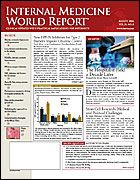Publication
Article
Internal Medicine World Report
Whole-Grain Diet Lowers Risk of Metabolic Syndrome, CVD in Elderly
Author(s):
American Journal of Clinical Nutrition
A first-of-its-kind study indicates that elderly persons can significantly reduce their risk of developing the metabolic syndrome or of dying from cardiovascular disease (CVD) if they eat a diet rich in whole grains, according to data reported in the (2006;83:124-131).
This 4-year study was the first to estimate dietary intake by reviewing diet records rather than by using food-frequency questionnaires and the first to look at the metabolic syndrome and mortality outcomes in the same population.
The study included 535 healthy elderly persons (179 men, 356 women; mean age, 72 years) who kept a 3-dimensional food record and underwent blood testing for metabolic risk factors. The study began in 1981 and ended in 1984.
Among men, average daily intakes were 1.6 servings of whole grains and 4.5 servings of refined grains. The respective numbers for women were 1.3 and 3.3 servings. Bread, specifically whole wheat bread, made up 53% of dietary whole grains, and ready-to-eat cold cereal accounted for 19% and hot cereal for 15% of the total whole grain diet. In approximately 16% of men and 7% of women, whole grain intake was ≥3 servings daily.
P
P
An inverse trend was reported between whole grain consumption and the metabolic syndrome ( for trend = .005) as well as for mortality from CVD ( for trend = .04), both of which were independent of demographic, lifestyle, and dietary factors.
P
P
P
Also independent of confounding factors, fasting glucose concentrations and body mass index decreased as whole-grain intake increased ( for trend = .01 and .03, respectively), while greater intake of refined grain was associated with increased elevation in fasting glucose concentrations ( for trend = .04) and a greater incidence of the metabolic syndrome ( for trend = .01).
“The data indicated that there was an association between whole-grain intake and the metabolic syndrome,” wrote lead investigator Nadine R. Sahyoun, PhD, of the University of Maryland, College Park, and colleagues.
“Whole grain intake is a modifiable dietary risk factor that may lead to substantial benefits at the population level,” the authors concluded, “even in older populations.”





